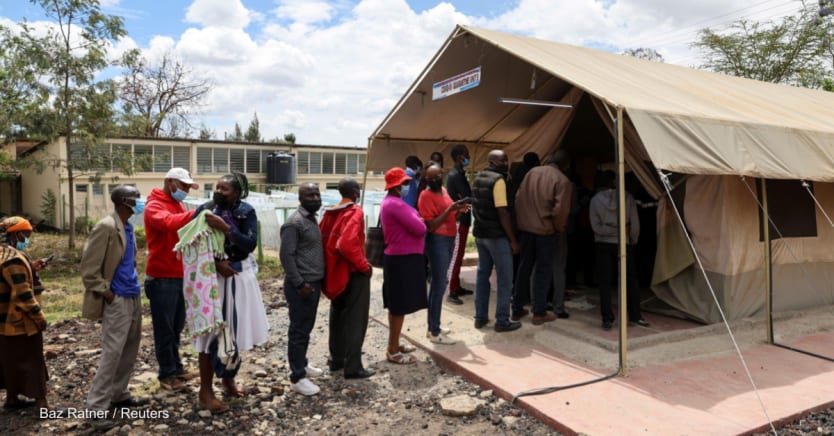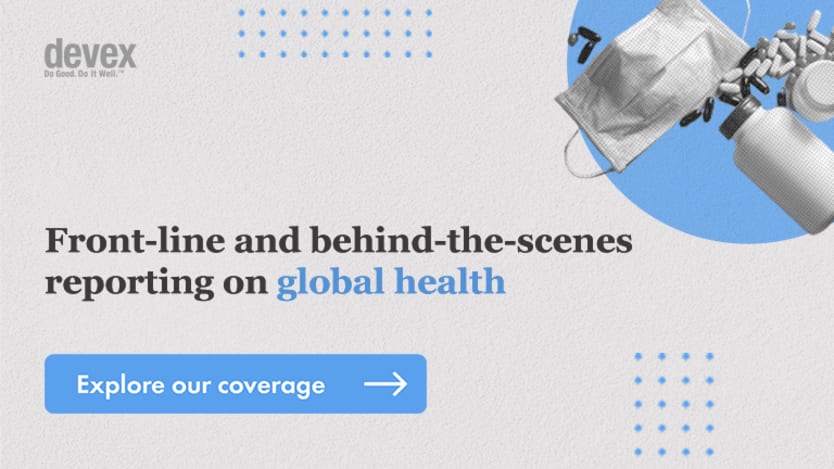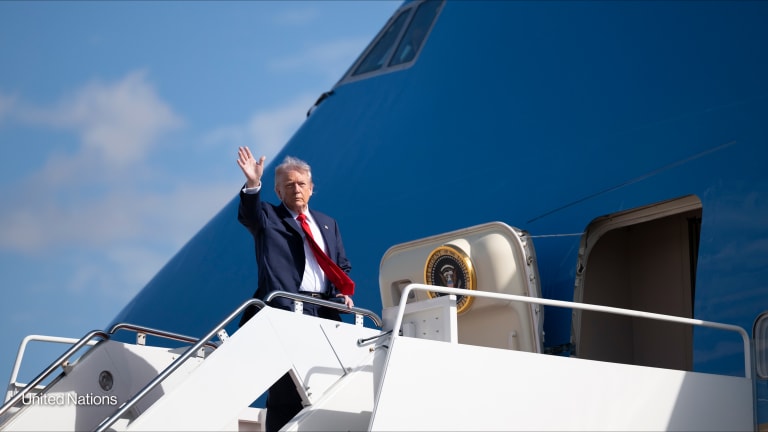10 hurdles to Africa’s COVID-19 recovery: Mo Ibrahim Foundation report

Efforts to recover from the COVID-19 pandemic across the African continent, have been met by formidable hurdles. The Mo Ibrahim Foundation report, released Monday, examines these challenges through the lens of governance performance in 54 African nations between 2010 through 2019, marking gains and losses during that time frame.
Sign up for Devex CheckUp
The must-read weekly newsletter for exclusive global health news and insider insights.
“To be frank, the potential is there, but so are the hurdles and the challenges,” said Nathalie Delapalme, executive director of the foundation, during a press briefing.
Below are the foundation’s top 10 takeaways:
• Unvaccinated and unregistered. Only about 6.8% of the continent’s population is vaccinated for COVID-19 and only five African countries are expected to hit the year-end global target of vaccinating 40% of their populations. According to the foundation, there can be “no real recovery” at these levels of vaccination.
Also, many people living on the African continent aren’t legally registered — and that impacts health policy and the ability for people to access public services. More than 50% of children in Africa are not registered, and only 10% of deaths are. This means COVID-19 cases and deaths could be vastly underestimated and people might be left out of vaccination campaigns. Overall, registration efforts on the continent were worse in 2019 than in 2010.
The most improved countries in civil registration include Liberia, São Tomé and Príncipe, Angola, Chad, and Côte d’Ivoire. Whereas the countries experiencing the sharpest decline include Eritrea, Mali, Democratic Republic of Congo, Egypt, and Sudan.
• Out of reach. There is a high cost for many people to access health care and not enough public investment. Only 10 countries provide citizens with free, universal health coverage. Countries, through the 2001 Abuja Declaration, were supposed to aim to allocate 15% of their budgets toward health spending, but only seven countries have done this at least once since this goal was set.
In sub-Saharan Africa, domestic health spending as a share of gross domestic product was only 1.9% in 2018. Overall, health is less accessible in 2019, as opposed to 2010.
The most improved countries in this area were Mali, Ethiopia, Côte d’Ivoire, Comoros, and Morocco. Whereas the countries experiencing the sharpest decline include Guinea-Bissau, Libya, Uganda, Namibia, and Eritrea.
• Pandemic preparedness. Following the International Health Regulations is a sign of a country’s preparedness to handle health emergencies, such as pandemics. Overall, Africa performs worse than other regions in the world in compliance with these IHR rules. While there have been improvements, there are warning signs since 2015 on deterioration of compliance in nations.
The most improved countries were Seychelles, Togo, Sierra Leone, Guinea, and Mozambique. Whereas the countries experiencing the sharpest decline include Benin, Gambia, Mali, São Tomé and Príncipe, and Malawi.
• Learning crisis. Even before the pandemic, African students overall had the lowest minimum education proficiency levels in the world. Since 2019, schools are better staffed, access is more equal for genders, and there are higher enrollment and completion rates than in 2010, but quality has also dropped.
The most improved countries were Burundi, Burkina Faso, Benin, Côte d’Ivoire, and Sierra Leone, whereas the countries experiencing the sharpest decline include Libya, Eritrea, Nigeria, Guinea-Bissau, and Tunisia.
• Gender inequality. COVID-19 reversed gains in maternal and child care in many African nations, and exposed women and girls to increased gender-based violence. While socioeconomic progress for women has overall increased equity among genders since 2010, legal systems to protect women against violence are still insufficient.
The most improved countries were Somalia, Kenya, Gambia, Republic of Congo, and Zambia. Whereas the countries experiencing the sharpest decline include Equatorial Guinea, Mozambique, Uganda, Ghana, and South Africa.
• Shrinking civil society. The space for civil society organizations, media, and activists has declined since the early 2000s, with “these actors facing restricting laws and policies as well as physical attacks, threats and discrimination,” according to the report.
In media freedom, Gambia, Tunisia, Libya, Ethiopia, and Angola are the most improved, whereas the countries experiencing the sharpest decline include Burundi, Ghana, Kenya, Benin, and Algeria.
• Insufficient safety nets. Overall, there are not enough social programs for populations to weather rough times, such as cash transfers, food support, and energy subsidization. “In many African countries safety nets remain smaller in scope, and new initiatives have often failed to reach all of those in need of assistance,” according to the report.
The most improved countries were Cabo Verde, Djibouti, Côte d’Ivoire, Kenya, São Tomé and Príncipe. Whereas the countries experiencing the sharpest decline include Libya, Niger, Mali, Mauritius, and Gabon.
The growing tension between energy access and tackling climate change (Devex Pro)
Ahead of COP 26, the focus has been on emissions reductions and tackling the climate crisis but that has set up tension with another global objective: energy access. That’s particularly true in Africa, where the dueling objectives could create inequalities.
• Low energy access. There are over 600 million people on the African continent off energy grids. Only Algeria, Egypt, Morocco, and Seychelles had universal electricity access in 2019.
Almost all African nations have increased energy access to its citizens since 2010, with Mauritius and Libya as the only countries in decline.
• Digital divide. "The digital economy is an area of strength for African countries, enabling them to boost their economic recoveries and in the process draw on a young generation of digital entrepreneurs adapting to the new global conditions," according to the report. But access to computers and the internet is still unequal. In 2019, only 10 African countries had at least 50% of the households accessing the internet.
All countries improved in this area on the continent, with Morocco, Tunisia, Algeria, Kenya, and Cabo Verde improving the most.
• Inadequate intercontinental transport networks. While the newly established African Continental Free Trade Area aims to empower countries economically by facilitating trade through a single African market, there is still a need to address nontariff barriers, such as the continent’s insufficient transport infrastructure. “Without the infrastructure to ease movement within the continent, intra-regional trade will continue to be costly and inaccessible, regardless of tariff reductions,” according to the report.
The most improved countries were Guinea, Tanzania, Burundi, Egypt, and Senegal. Whereas the countries experiencing the sharpest decline include Togo, Liberia, Republic of Congo, Libya, and Tunisia.

Search for articles
Most Read
- 1
- 2
- 3
- 4
- 5




